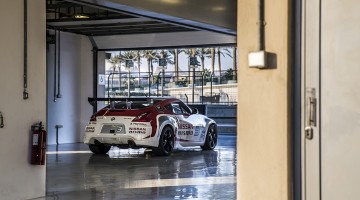What next for Nissan and the GT Academy? crankandpiston catches up with the team to discuss the significance of the Middle East chapter, the expansion of the Academy across the globe, and why a female winner might be just around the corner.
Last year the Nissan GT Academy completed its fifth season in Europe. The Academy, a combined dream of Kazunori Yamauchi (creator of GranTurismo for the Sony Playstation) and Darren Cox (global director of motorsport at Nissan), was launched to much scepticism in 2008, many doubting the credibility of ‘gamers’ as racing diamonds in the virtual rough. Yet previous winners Lucas Ordonez (podium finisher at the 24 Hours of Le Mans), Jann Mardenborough (European Formula 3 points scorer) and Jordan Tresson (World Endurance Championship class podium finisher) have thus far proven the concept a sound one.
As well as the performance of its latest prodigy – Salman Al Khater of Qatar – the question now is, where does Nissan go from here? Having established the Academy as not only lucrative but popular too (with entrant numbers anticipated to hit two million for the sixth season in Europe), where next does ‘virtual become reality’?
“The response we had in the Middle East and Africa was incredible,” explains Jonathan Bowers, account director – and oracle – of the GT Academy. “So we’re looking at other exciting new markets that are, perhaps, less traditionally involved in motorsport. We’re finding great young racing drivers like Salman [Al Khater] who will hopefully go on to become an inspiration and a great Ambassador for their regions in motorsport.”
Options for expansion include Asia, South America and even India. The big name however is Australia, which despite boasting two native-born finalists in the first year of the Academy, failed to take the bait. This in spite of Australia’s keen motorsport enthusiasm and its vehemently supported tin top championship, the V8 Supercars: a series in which Nissan goes head-to-head against firm fan favourites Ford and Holden. Crowd support is expected to be almost hilariously lacking. Unless of course the Japanese marque can find a hook…
“A competition specifically for Australia would of course be great. The best way to promote GT Academy is to by having a regional winner”, Jonathan explains.
It’s a solid point, particular considering Salman hopes his achievements will help promote motorsport in the Middle East, given the difficulties involved with establishing a grass roots base. Indeed, while season two of GT Academy Middle East is just around the corner, Nissan is still considering changes that need to be made to help further establish the Academy – and motorsport’s credibility – in the region.
“Salman’s graduation race was the culmination of the first season, but we’re still looking at lessons learnt from bringing the program to the Middle East. It’s different wherever you go in the world and there are things to consider. For example the internet connection in the Middle East isn’t quite as strong as in Europe, and that means downloading Gran Turismo is difficult for some people because the game is very high res. So when we come back in the future the program will be bigger and better, and hopefully the support for motorsport and the Academy will get stronger in the region.”



